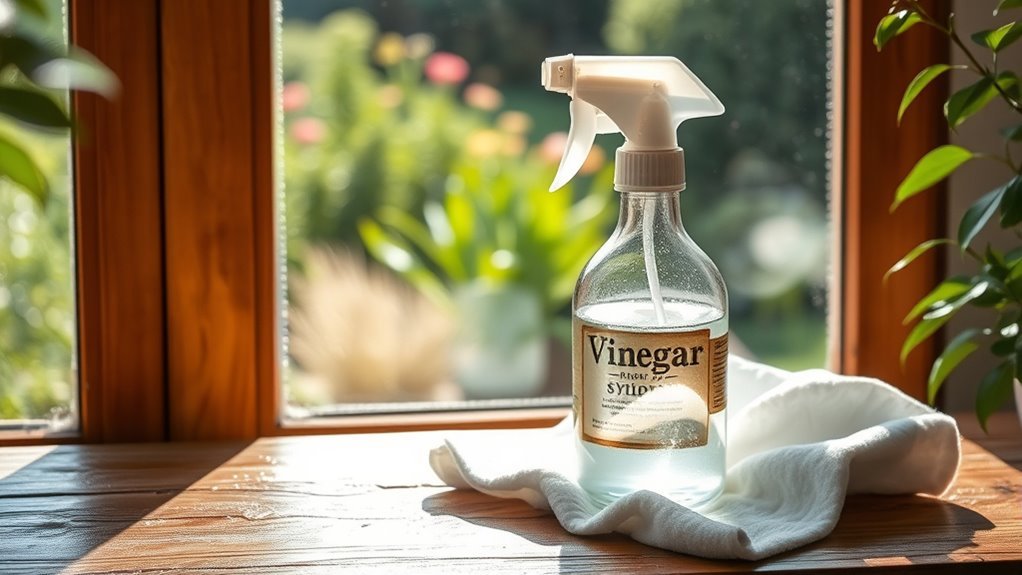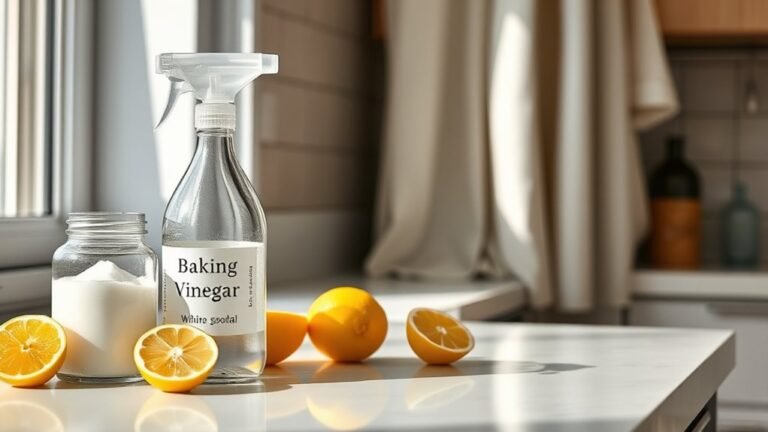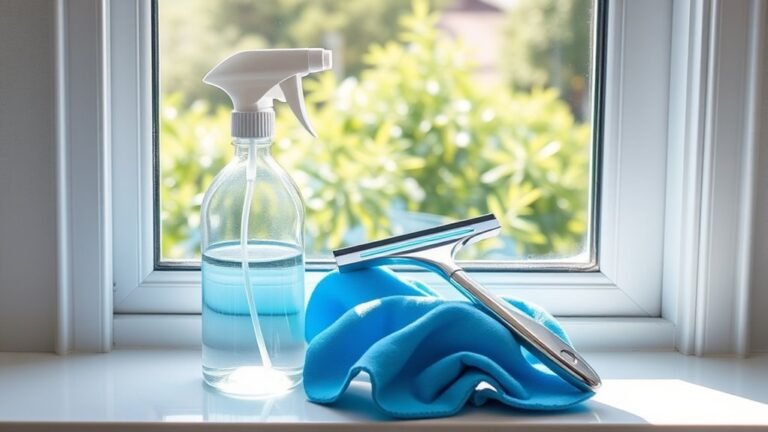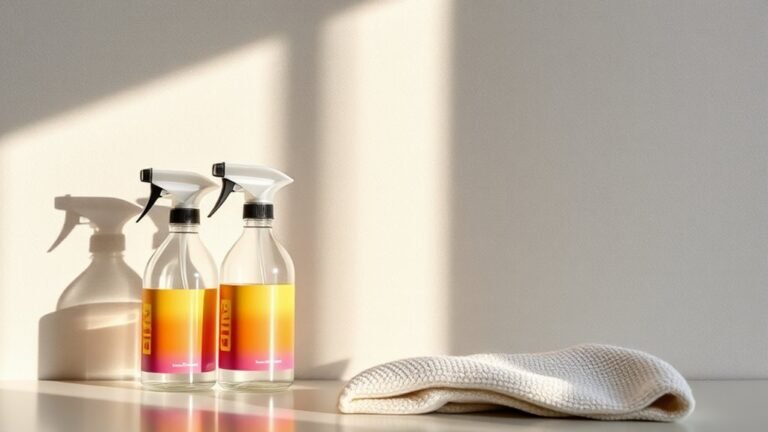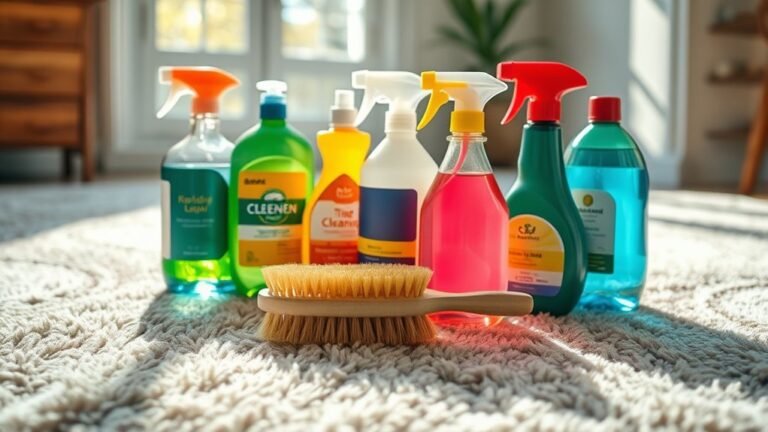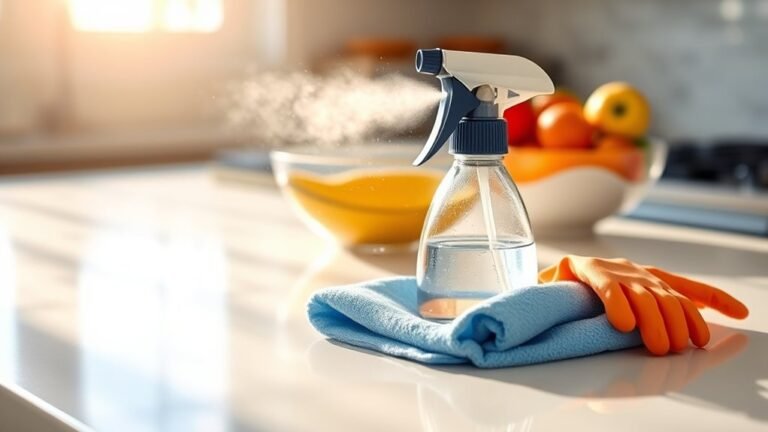Natural Cleaning Hacks for Your Glass
You can keep your glass sparkling by using natural cleaners like a mix of equal parts vinegar and water to cut grease, or lemon juice diluted with water for streak-free shine. Baking soda works great as a gentle abrasive to tackle stubborn spots without scratching. Use microfiber cloths to avoid marks, and store your homemade cleaners in airtight bottles. These simple hacks protect your glass and the environment, plus there’s plenty more easy tips to try for spotless results.
Benefits of Using Natural Ingredients for Glass Cleaning

Although commercial glass cleaners are popular, using natural ingredients offers several benefits you might not have considered. When you choose eco friendly alternatives, you’re not just protecting the environment—you’re also giving your glass surfaces gentle care that harsh chemicals can’t match. These natural options reduce the risk of damage, ensuring long-lasting surface protection without compromising clarity or shine. Plus, you gain the freedom to clean confidently, knowing you’re avoiding toxic fumes and unnecessary waste. By embracing natural ingredients, you’re taking a simple step toward a healthier home and planet. So, if you want to keep your glass sparkling while staying true to eco friendly values, natural cleaning solutions are the way to go.
How to Make a Vinegar-Based Glass Cleaner
Choosing natural ingredients for cleaning doesn’t mean you have to sacrifice effectiveness. Making your own vinegar-based glass cleaner is simple and liberating. Start by mixing equal parts of distilled white vinegar and water—that’s the ideal vinegar ratios to tackle grime without overpowering scents. Pour this blend into a spray bottle, and you’re all set. The cleaning benefits of vinegar are impressive: it cuts through grease, dissolves mineral deposits, and leaves glass sparkling streak-free. Plus, it’s non-toxic and eco-friendly, giving you freedom from harsh chemicals. Whenever you want crystal-clear windows or mirrors, just spray, wipe with a microfiber cloth, and enjoy the shine. This DIY cleaner gives you control, saving money and reducing waste while keeping your glass spotless.
Using Lemon Juice to Remove Streaks and Smudges

When you want to get rid of streaks and smudges on your glass surfaces, lemon juice is a natural solution that works wonders. Its natural acidity cuts through grease and grime, giving you crystal-clear results without harsh chemicals. The lemon juice benefits include its antibacterial properties and fresh scent, making your cleaning routine more enjoyable and safer. Try this simple lemon juice application:
- Squeeze fresh lemon juice into a spray bottle.
- Dilute with equal parts water for gentle cleaning.
- Spray onto the glass and wipe with a microfiber cloth.
- Buff dry to reveal a streak-free shine.
Using lemon juice lets you clean freely and naturally, keeping your space fresh and spotless without compromising your values.
Baking Soda as a Gentle Abrasive for Tough Spots
One of the simplest and most effective ways to tackle tough spots on glass is by using baking soda. This natural ingredient acts as a gentle scrub, lifting grime without scratching the surface. You’re free to clean confidently, knowing you’re using a safe, non-toxic solution. Here’s how baking soda stands out:
| Benefit | Description |
|---|---|
| Mild Abrasive | Removes stubborn spots gently |
| Non-Toxic | Safe for your home and environment |
| Cost-Effective | Affordable and readily available |
| Versatile | Works on windows, mirrors, and more |
To use, sprinkle baking soda on a damp cloth and gently rub the tough areas. Then rinse with water for sparkling clean glass that respects your freedom to choose natural solutions.
The Role of Cornstarch in Glass Cleaning Solutions

You might be surprised how cornstarch can boost your glass cleaning routine. It works by gently absorbing grease and leaving a streak-free shine behind. Let’s explore why cornstarch is a natural choice for sparkling windows.
Cornstarch Cleaning Benefits
Although it might sound unusual, cornstarch can be a surprisingly effective ingredient in your glass cleaning routine. It offers a natural alternative to harsh chemicals, giving you freedom from toxins while keeping your surfaces sparkling. Here’s why cornstarch stands out among cornstarch alternatives:
- Absorbs grease and grime without scratching your glass.
- Leaves a streak-free finish, making windows crystal clear.
- Acts as a gentle abrasive, perfect for delicate surfaces.
- Versatile in various cornstarch applications beyond cleaning, like polishing.
Using cornstarch lets you embrace a simpler, eco-friendly approach to glass care. You’ll find it’s a cost-effective, safe way to maintain shine without sacrificing your desire for natural living. Give it a try and enjoy the freedom of cleaner, clearer glass!
How Cornstarch Works
Beyond its benefits, understanding how cornstarch works can help you make the most of its cleaning power. Cornstarch properties, like its fine texture and absorbency, let it lift grease, grime, and fingerprints from glass surfaces effortlessly. When mixed with water, it forms a gentle paste that breaks down stubborn stains without scratching or leaving residue. This natural abrasive quality means you don’t need harsh chemicals to get your glass sparkling. Cornstarch uses go beyond just cleaning; it also polishes and adds a streak-free shine, letting you enjoy clear, spotless glass with ease. By tapping into these unique properties, you’re empowered to clean smarter and freer, using a simple, eco-friendly ingredient that respects both your space and the environment.
Essential Oils for a Fresh Scent and Added Cleaning Power
When cleaning glass surfaces, adding essential oils can boost both the scent and effectiveness of your solution. You’re free to experiment with essential oil blends that not only smell amazing but also enhance cleaning power. Here are four scent combinations to try:
- Lemon and eucalyptus – cuts grease and leaves a fresh, invigorating aroma.
- Lavender and tea tree – offers antibacterial benefits with a calming fragrance.
- Peppermint and rosemary – energizes your space while fighting grime.
- Orange and cinnamon – creates a warm, inviting scent that also acts as a natural disinfectant.
Tips for Cleaning Mirrors Without Leaving Marks
Adding essential oils to your glass cleaner can enhance both scent and cleaning power, but cleaning mirrors without leaving streaks requires a bit of technique. For effective mirror maintenance, start with a microfiber cloth—its fine fibers grip dirt without scratching. Spray your natural cleaner lightly; too much liquid invites streaks. Wipe in a circular motion first, then finish with vertical or horizontal strokes to guarantee streak prevention. Avoid paper towels as they can leave lint behind. Also, clean mirrors in a cool, shaded area to prevent quick drying, which causes marks. If streaks appear, buff them gently with a dry microfiber cloth. With these tips, you’ll enjoy sparkling mirrors that reflect your freedom to keep things simple and spotless.
Best Practices for Cleaning Windows on a Sunny Day
Anyone who’s tried cleaning windows on a sunny day knows the challenge: your cleaner can dry too quickly, leaving streaks and spots behind. To keep your glass free of window streaks and avoid annoying sunny reflections, try these best practices:
- Choose a cooler part of the day, like early morning or late afternoon.
- Use a natural cleaner like vinegar mixed with water to reduce residue.
- Work in small sections, wiping immediately with a microfiber cloth to prevent quick drying.
- Avoid paper towels—opt for lint-free cloths or squeegees to glide smoothly and capture dirt.
How to Clean Glassware Without Scratches
When cleaning glassware, you’ll want to choose soft materials like microfiber cloths to prevent scratches. Avoid abrasive chemicals that can damage the surface, and stick to gentle cleaning techniques to keep your glass looking clear and pristine. These simple steps help preserve your glassware’s shine without causing harm.
Choose Soft Cleaning Materials
One of the simplest ways to keep your glassware scratch-free is to always use soft cleaning materials. You want to avoid anything abrasive that might leave marks or dull the shine. Instead, stick to gentle tools that let you clean freely without worry. Here’s what to use:
- Microfiber cloths – they’re soft, absorbent, and perfect for polishing glass without scratching.
- Soft sponges – choose ones labeled non-abrasive to safely wash away grime.
- Cotton cloths – natural and gentle, these are great for drying and buffing.
- Soft brushes with fine bristles – ideal for reaching narrow spots without damage.
Avoid Abrasive Chemicals
Three key reasons to avoid abrasive chemicals when cleaning glassware are to preserve clarity, prevent scratches, and maintain longevity. When you choose harsh cleaners, you risk dulling the surface and creating tiny scratches that ruin the glass’s natural shine. Instead, opt for eco friendly alternatives like vinegar, baking soda, or mild castile soap. These options respect chemical safety by minimizing harmful residues that can affect your health and the environment. By steering clear of abrasive substances, you not only protect your glassware but also embrace a lifestyle that values freedom from toxic chemicals. This way, your glass stays clear and beautiful longer, letting you enjoy its full brilliance without worrying about damage or unsafe ingredients.
Use Gentle Cleaning Techniques
Choosing gentle cleaning techniques goes hand in hand with avoiding harsh chemicals to keep your glassware pristine. You want to protect your freedom from scratches and dullness, so stick to methods that respect your glass’s delicate nature. Here’s how to clean without damage:
- Use soft cloths like microfiber or cotton to prevent abrasion.
- Avoid scrubbing pads or rough sponges that can create tiny scratches.
- Clean with lukewarm water and mild soap, steering clear of anything acidic or abrasive.
- Dry your glass gently with a soft, lint-free towel instead of air drying to avoid spots.
Storing Homemade Glass Cleaners Safely and Effectively
Although homemade glass cleaners are simple to make, storing them properly is essential to maintain their effectiveness and guarantee safety. First, focus on proper container selection. Choose airtight, non-reactive bottles like glass or BPA-free plastic to preserve your cleaner’s natural ingredients. Avoid containers that can leach chemicals or degrade over time. Next, follow clear label storage guidelines—mark each bottle with the cleaner’s contents and date made. This helps you track freshness and avoid confusion. Store your cleaners away from direct sunlight and extreme temperatures to keep them potent longer. By mastering these storage basics, you’ll enjoy hassle-free, eco-friendly cleaning whenever you want, without compromising safety or freedom.
Frequently Asked Questions
Can Natural Glass Cleaners Damage Tinted or Coated Glass Surfaces?
You might wonder if natural glass cleaners can harm tinted glass or coated surfaces. The good news is, most natural cleaners are gentle and free from harsh chemicals, so they usually won’t damage these delicate finishes. However, you should avoid acidic ingredients like vinegar on coated surfaces, as they can wear down the protective layer. Always test a small spot first to keep your tinted glass looking flawless and enjoy cleaning with peace of mind.
How Often Should Natural Glass Cleaning Be Done for Optimal Results?
Think of cleaning your glass like watering a plant—too little, and it wilts; too much, and it’s wasted effort. For best results, frequency recommendations suggest a good clean every two weeks, adjusting with seasonal cleaning when pollen or dust spikes. By sticking to this rhythm, you free yourself from constant scrubbing, keeping your glass sparkling effortlessly. Embrace this simple routine, and you’ll enjoy clearer views without feeling chained to chores.
Are Natural Glass Cleaning Methods Safe for Antique or Delicate Glass?
You’ll want to be extra careful with antique glass preservation since harsh chemicals can damage it. Natural methods are generally safer, but you should still use delicate glass techniques like gentle wiping with a soft cloth and mild solutions such as diluted vinegar or distilled water. Avoid abrasive scrubbing to keep the glass intact. This way, you maintain your freedom to enjoy your treasures without risking any harm to their delicate surfaces.
Can Natural Ingredients Prevent Glass Fogging or Condensation?
You might wonder if natural ingredients can help with fog prevention techniques on your glass surfaces. They actually can be quite effective! Ingredients like vinegar, rubbing alcohol, and even a bit of dish soap create a thin barrier that reduces condensation buildup. These natural ingredient effectiveness methods let you enjoy clear, fog-free glass without relying on harsh chemicals, giving you the freedom to keep things simple and eco-friendly in your space.
What Are the Environmental Impacts of Homemade Glass Cleaners?
When you make your own glass cleaner, you’re tapping into real sustainability benefits. You control ingredient sourcing, choosing eco-friendly, biodegradable items instead of harsh chemicals that harm the planet. This freedom lets you reduce plastic waste by reusing containers and avoid toxic fumes, creating a safer environment for you and your loved ones. So, homemade cleaners not only clean your glass but also support a greener, freer lifestyle.
